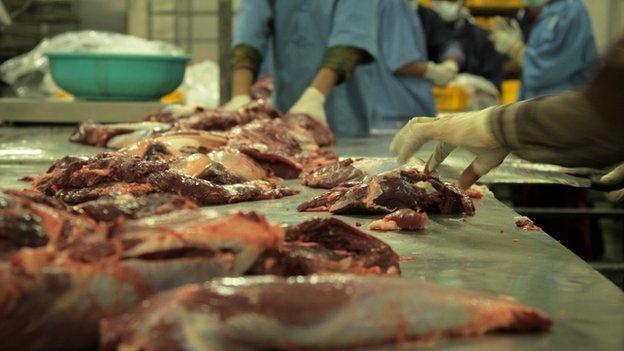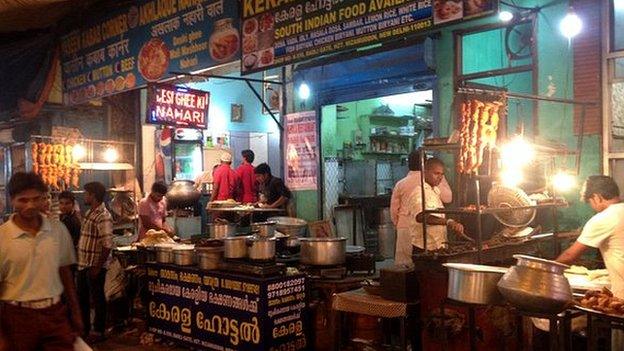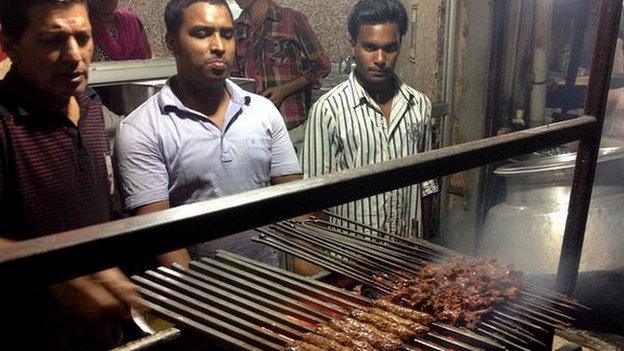India's elections spark debate on beef exports
- Published
India's beef industry has made it on to the election agenda
One meaty issue that has dominated the election rhetoric this season has been the issue of beef exports. And a leading candidate for the prime minister's post has attacked the current government's position on the beef trade.
In South Delhi, it is early in the morning and a steady stream of visitors are lining up with food packets in their hands. Some have sacks of jaggery, or sugar cane, while others have sacks of grass, but nearly everyone has a couple of rotis, or flat breads, on offer.
They are waiting to feed about 700 cows in an open temple yard in the area.
Large, unused buildings in many cities have been transformed to house old and abandoned cattle, so devout Hindus can come to feed them and pray to them.
That is why India's status as an international beef exporter is a shock to many Indian residents.
Housewife Jagriti Chadha has been to the temple for more than a decade to seek blessings from the holy cows in the yard.
"I'm shocked," she says.
"We believe thousands of Hindu gods reside in the cows, that's why we feed them every day.
"Our ancestors' spirits bless us through these cows. How can anyone think of killing them and making money of it?"
Narendra Modi, the prime ministerial candidate of the Hindu nationalist Bharatiya Janata Party (BJP), has attacked the current government over India's position as one of the world's biggest beef exporters.
Indian exports account for about 20% of the global supply and while economically this might seem to be a good thing, in India, the cow is revered as holy by Hindus, and so the consumption and sale of beef always sparks fierce political and religious debate.
However, it is not cows but the less revered water buffaloes that mostly make the cut for meat-processing factories.
Half of the world's buffalo population is in India, and global demand for buffalo meat has become a source of revenue and brought in a lot of money for the country.
Both buffalo meat and meat from cows are known as beef internationally.
A few hours outside Delhi, in neighbouring Uttar Pradesh, there is a network of beef-processing factories.

India's beef traders are seeing more orders from overseas
Chopped into the choicest cuts, the beef processed here is headed for dinner tables across the world.
By processing the beef according to halal standards - or Islamic laws - companies like Al Saqib Exports have had success exporting to markets in west Asia and north Africa.
India sells $3.2bn (£1.9bn) worth of buffalo meat annually to more than 65 countries.
And the demand for buffalo meat - leaner and cheaper than cow meat - is growing.
Al Saqib's director, Saqib Akhlaq, says he already owns five processing plants and is now building two more slaughterhouses because of the huge demand.
"Indian beef is very good quality and comparable to Brazilian meat so we hope to export to more countries soon. We are getting very good prices."
Worried traders
While the beef traders and exporters are financially benefitting from the lucrative meat industry, this part of the economy has been a target of criticism and has been a feature in the election speeches of the main opposition party, the Hindu nationalist BJP.
Narendra Modi wants to put a stop to the beef trade. In his election speeches he has been calling it India's "pink revolution".
That has the traders worried - though no-one is willing to talk about it publicly just yet.
But while exports are driving growth in the country's meat industry, even within India, the appetite for buffalo beef is seeing a steady rise. Consumption is growing, especially in urban areas.
One such place seeing rising intake of buffalo meat is in central Delhi's Nizammudin, known for its street of kebab shops.

Food stall owners in central Delhi are increasingly offering beef on their menu
Young and old, people throng the little shops, as slivers of beef sizzle on the hot coals.
In Ghalib's kebab shop, chef Muhammad Shahab Khan prides himself on his secret recipe.
"I have been cooking here for decades," he says.
"Tourists and locals come here from all over as we choose the best meat. But now I see lot more young people come and ask for beef rolls and kebabs."
While chicken and fish still dominate the diet of non-vegetarians, there seems to be little doubt that beef is becoming a popular meal option.

Beef kebabs are a become a popular meal option for locals
Abhijit Junagde is a frequent traveller and he enjoys eating beef in a variety of ways, and has sampled many beef dishes from around the world.
"I'd love to have more of it in India, especially if it can be made more hygienically and presented well," he says.
His colleague, Aishwaryaa Bodke, says: "I like eating beef a lot - it's delicious. I prefer red meat over chicken.
"But I have to keep on exploring places and looking for it as it's not readily available in India."
For now, India's laws banning the slaughter of cows and making it tough for restaurants to serve beef do not seem to be holding back the market too much.
But there is an anxiety that if the BJP comes to power - and if it stands by its anti-beef manifesto - then the industry in India risks losing some of its shine.